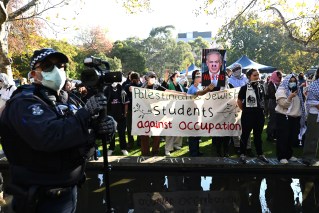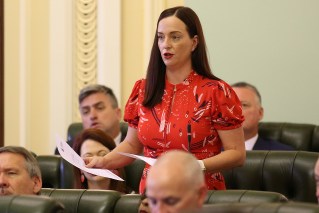PM says Australia has no problems with Assange heading home

Julian Assange could come home says the PM. Photo: AAP
Julian Assange’s legal team will move to have the Australian freed from a British jail after a judge ruled he could not be sent to the United States.
Already by Tuesday morning, the WikiLeaks founder had received a public offer for political asylum as messages of support came in from around the world.
Mexico’s president said Assange deserved protection.
“Assange is a journalist and deserves a chance, I am in favour of pardoning him,” Mexican President Andres Manuel Lopez Obrador said.
It was a more lukewarm response from the Australian Prime Minister though, with Scott Morrison saying while Australia was not a party to the case, Assange was being offered continuous consular support as he continues to fight his case.
“Assuming that all that turns out, then he’s like any other Australian _ he’d be free to return home if he wished,” Mr Morrison told Melbourne radio 3AW on Tuesday.
The Australian journalists union called on the US to drop its attempts to prosecute Assange.
“Julian has suffered a 10-year ordeal for trying to bring information of public interest to the light of day,” Media Entertainment and Arts Alliance President Marcus Strom said.
“But we are dismayed that the judge showed no concern for press freedom in any of her comments, and effectively accepted the US arguments that journalists can be prosecuted for exposing war crimes and other government secrets, and for protecting their sources.”
Monday night’s ruling was a major victory for Assange – but his fight is far from over.
Outside court, Assange’s partner said the ruling was “the first step towards justice” but that the family would not celebrate until the US stopped its pursuit of Assange.
Full speech following Julian's historic victory in court today. https://t.co/LkiSl38nqm
— Stella Assange #FreeAssangeNOW (@Stella_Assange) January 4, 2021
“I had hoped that today would be the day that Julian would come home,” Stella Morris said.
“Today is not that day, but that day will come soon.
“As long as Julian has to endure suffering and isolation…and as long as our children continue to be bereft of their father’s love and affection we can not celebrate.”
She said the US wanted to make her partner “disappear into the deepest, darkest hole of the US prison system for the rest of his life”.
“That can never happen – we will never accept that journalism is a crime,” Ms Morris said.
We welcome the fact that Julian Assange will not be sent to the USA, but this does not absolve the UK from having engaged in this politically-motivated process at the behest of the USA and putting media freedom and freedom of expression on trial.
— Amnesty International (@amnesty) January 4, 2021
‘Extradition would be oppressive’
District Judge Vanessa Baraitser ruled the extradition to the US was unwarranted on mental health grounds and could result in Assange’s death.
Outlining her decision that “extradition would be oppressive by reason of Assange’s mental health”, Judge Baraitser told London’s Central Criminal Court she was satisfied that procedures described by the US would not prevent Assange, 49, from finding a way to commit suicide in a US supermax prison.
Acknowledging doctors’ opinions that Assange suffers from recurrent depressive disorder and is autistic, Judge Baraitser said Assange was “at a high risk of suicide”.
Shadowproofcom managing editor Kevin Gosztola live-tweeted the judge’s comments including that “there is a ‘real risk’ [Assange] will be detained subject to special administrative measures in US prison, especially because intelligence community is hostile to him”.
Julian #Assange has been discharged by the judge at the Old Bailey on grounds that he was too great a suicide risk if extradited to the US. This is wonderful! It's a face-saving cover for the British to justify their disgraceful political trial of #Assange on America's behalf.
— John Pilger (@johnpilger) January 4, 2021
The judge rejected many of Assange’s legal arguments, including that the charges were politically motivated and that he would not receive a fair trial in America.
The judge and defence teams later discussed an application for bail.
The US government is expected to appeal against the decision within the designated 15-day period.
Baraitser says Assange is at high risk of suicide and that there is a "real risk" he will be detained subject to special administrative measures (SAMs) in US prison, especially because intelligence community is hostile to him
— Kevin Gosztola (@kgosztola) January 4, 2021
Judge says Assange went beyond journalism
Earlier, Judge Baraitser said Assange’s conduct went beyond that of investigative journalism, and delved into hacking when agreeing to help Chelsea Manning crack a multi-step password.
Arguing that the Townsville-born Assange was in violation of the Official Secrets Act, the judge said the allegations, if proven, “would therefore amount to offences in this jurisdiction that would not be protected by his freedom of speech”.
Outlining that Assange would be tried in the US after the Extradition Act of 2003 was applied, Judge Baraitser said he would face charges including espionage over the release of secret military documents.
“It is not the UK-US Treaty that creates enforceable rights, but the Extradition Act of 2003. The act removed the bar on extraditing for political offences,” Judge Baraitser said.
Breaking: UK judge rules against extradition of Assange to US #AssangeCase
— WikiLeaks (@wikileaks) January 4, 2021
In her judgment Judge Baraitser also dismissed the allegations against UC Global related to spying on Assange in the Ecuador embassy, where he had been since 2012. She said it was inappropriate for the court to make findings of fact on evidence still being investigated in Spain.
When Assange was finally dragged out of the embassy in April 2019, he was jailed for breaching British bail conditions although the Swedish case against him had been dropped.

Stella Moris, girlfriend of Julian Assange, arrives at the Old Bailey in London on Monday. Photo: AP
During a three-week extradition hearing in September, US authorities accused Assange of 18 counts of conspiring to hack government computers and releasing vast troves of confidential military records and diplomatic cables in 2010.
In April 2010, WikiLeaks had published a US military video showing a 2007 attack by Apache helicopters in Baghdad that killed a dozen people. It then released thousands of secret classified files and diplomatic cables in July and October.
Soon after, Sweden sought Assange’s extradition from Britain over allegations of sex crimes.
Great news from London – Julian Assange’s extradition to US denied by UK court. US President must rule out an appeal. UK PM must release him. And Oz PM must allow him to return home a free man. Assange was always the hero, not the villain #auspol #politas #FreeAssange
— Andrew Wilkie MP (@WilkieMP) January 4, 2021
What’s next for Assange?
If found guilty of espionage, Assange could go to prison for 30 to 40 years, his lawyers have said, though prosecutors have predicted he would face no more than 63 months in jail.
The appeal is likely to be heard at London’s High Court and the case could then go to the United Kingdom’s Supreme Court, further delaying the final outcome.
US prosecutors and Western security officials see Assange as a reckless and dangerous enemy of the state whose actions risked the lives of agents whose names were in the material.
Supporters regard him as an anti-establishment hero victimised because he exposed US wrongdoing in wars in Afghanistan and Iraq. They say his prosecution is an assault on journalism and free speech.
Lifeline 13 11 14








